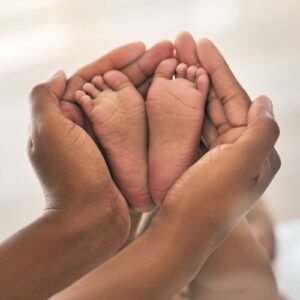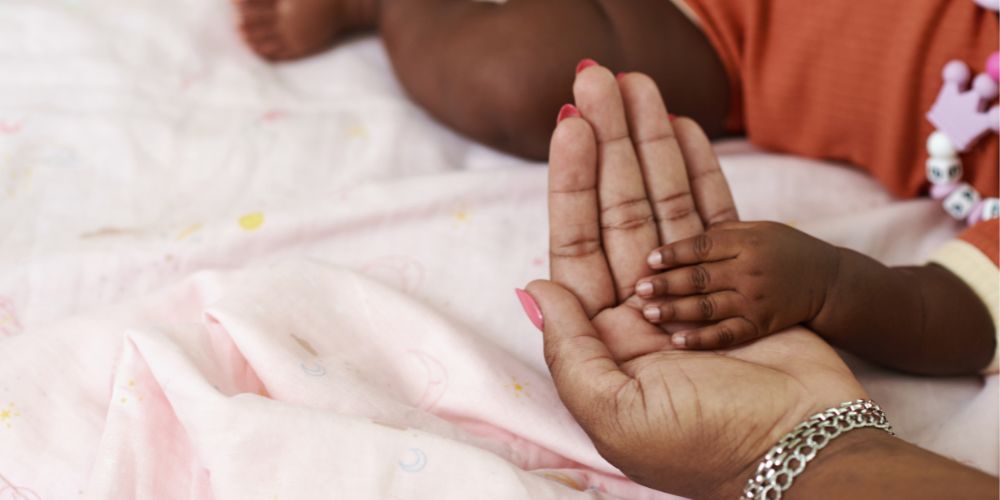This Adoptive Mom Shows Us It’s Never Too Late to Be a Parent
Benita always knew she wanted children. Growing up, she said, “I wanted four kids—two girls and two boys, just like my mom.” But when she couldn’t have children biologically, she knew she’d have to start a family another way. “When I turned 50, I told myself, ‘Whatever life you want to live, you need to start now,'” which is how Benita ended up adopting as an older parent.
Adopting later in life comes with a stigma we need to move past, but Benita’s story proves that it’s never too late to make a difference for a child in foster care.
Overcoming Discouragement Due to Her Age
Many of Benita’s friends had kids when they were younger and said they liked having more freedom once their kids got older. Still, they supported her decision to foster a newborn and encouraged her every step of the way, helping her push past any doubts.
“You know, most of my friends’ grandkids were [my daughter’s age], and so then I’m like, how am I going to socialize with people? A lot of things cross your mind.”
She admits part of the reason she hadn’t had kids was because she needed the traditional milestones—marriage, house, a yard. But when she realized none of that mattered as much as we are led to believe, she started foster parent training.
Friends told her she’d never be approved because of her age, but Benita didn’t care. She was ready. She would be happy to foster if it meant she could be a parent.
Just months later, she got the call—there was a baby in foster care waiting for her.
Meeting Her Daughter
Benita met her daughter at three weeks old.
“The first night I couldn’t sleep. I watched her sleep. I put her in the baby bed, and I watched her sleep…that night was amazing. You know, it’s like, pinch me! Is this real? Is she really here with me? I was scared to get too attached. But then just one day, I was like, forget that. Don’t hold back. Give her all the love that you have.”
New parent jitters and worries about birth parents
At the start of her journey, Benita was worried she might lose her daughter while fostering.
“When she first came home…maybe six months after being there, the mother had to name whoever the father was, which she did. If she was his, he wanted her.”

That uncertainty weighed heavily on her, but the support she received from those around her made all the difference.
“I thought my family may have thought I would not know how to take care of a child,” she admits. “But that was the total opposite. It was like everyone was so excited and so happy.”
Her loved ones embraced her daughter right away. “My next-door neighbors were so excited, they were just as excited as if they were my blood relatives.”
The welcome her daughter received was overwhelming. “The day she came home it was like ‘Oh, can I hold her? She’s so special. I’m so happy for you…Nobody cares whether it’s your natural-born child. All they care about is, that is your child.”
Two years later, Benita was finally able to adopt her daughter and make it official.
Finding Community
Benita also found community in other adoptive and kinship families. She found a group of moms who now come together to form a tight-knit community. “We get together—these kids who have no siblings, have friends that are siblings, and we do things together. We’ll go out to dinner, we’ll go to the movies. It’s a lot of fun.”
As her daughter grew, Benita realized that many of the families around her were built in nontraditional ways. “But you would never know. Nobody would. There’s no way to know, and once you know, do you care? I don’t. It does not matter. They’re just like any other kid.”
The Benefits of Fostering and Adopting as an Older Parent
Adopting as an older parent comes with several advantages, as Benita found one. One of which being greater financial security. “I’m more financially set to do a lot of things with her than what I would have been being a younger parent,” she explains, “I’m always trying to find something to do, somewhere to go. I’m more knowledgeable, more experienced. Take her on a trip once or twice a year. She visits different cities and learns the history of the cities.”
Benita says she felt more able to provide for her daughter, especially with the support foster parents typically receive, like stipends and childcare.
“The most rewarding thing is just to see the love and the growth. To see that you had an influence on a part of someone else’s life…I have it all—the bonding, the pride, the friendship, the laughter. I couldn’t have asked for anything else.”
She encourages others who might be considering adoption later in life to see the positives. “Don’t let your age hold you back. If you have the love to give, and you’re in a good place in life, you can be a wonderful parent at any age.”
Her advice for older individuals hesitant to foster or adopting as an older parent? Just do it.
“Do it. Don’t overthink it. Don’t be scared. You can do it! You’re older, you’re wiser, you have more knowledge. And if you’re thinking about doing it, that’s it. It’s because you want it. Go to a foster care meeting, meet foster parents, you know–ask the questions! We can all succeed [as parents.]”
Looking Forward

Her experience has been nothing short of life-changing. “It’s the best thing in life I’ve done,” she said. “When she’s outside, taking pictures of the moon, telling me stuff she’s learned in school, you know, my chest is sticking out like ‘Oh, that’s my daughter! Look at this, she’s learning! Like I said, she’s the light of my life.”
—
Benita’s story of adopting as an older parent shows us the incredible impact that fostering and adoption can have, and that there is no assigned timeline in our lives to accomplish what we want. Her journey reminds us that family isn’t just about biology—it’s about love, commitment, and the willingness to take that first step into the unknown.



